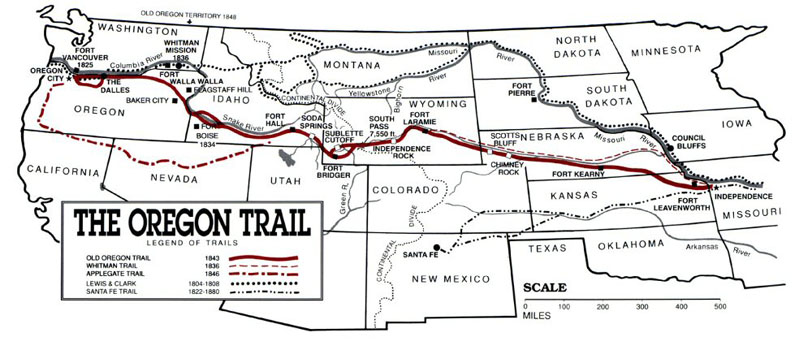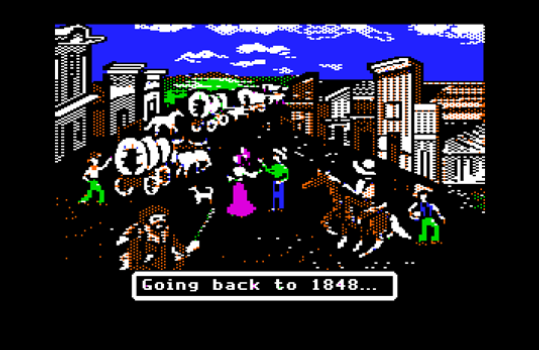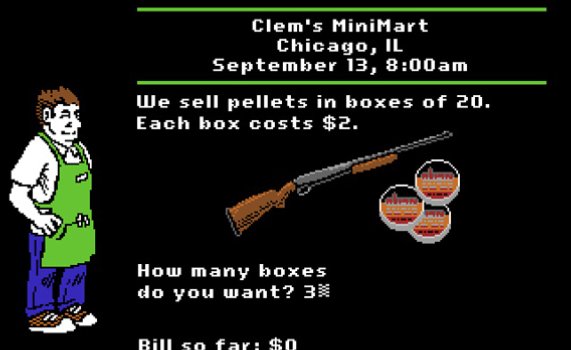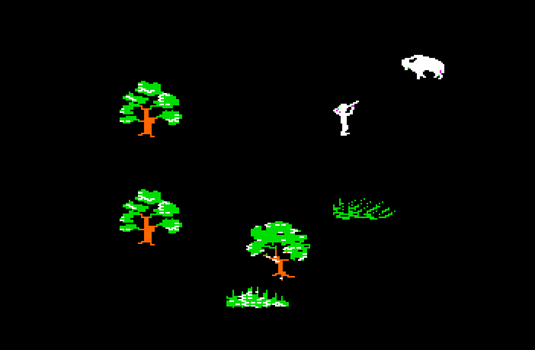|
Trail Blazing By: PoisonRamune, the Apathetic Lizardman
The year was 1848, America was moving west. A young pioneer family travels down the plane at a grueling pace, their stomachs barely filled due to their meager ration portions. 83 miles from the next landmark the wagon breaks an axle and Jill, the youngest daughter develops a sudden case of dysentery. These are just the mildest of the problems this family will face on their way down the Oregon Trail. But not to fear, for there are helpful: Indians, frontiersmen and other wagoneers along the way, willing and ready to lend a hand.
This was the world of Oregon Trail and if you were part of the United States public school system in its darkest of days (the mid to late 80’s); then there was no doubt that you were playing this game during class, every Friday before lunch. Oregon Trail was a strange game in my school’s software library. As it was obviously an educational game, but you actually enjoyed playing it. While I did enjoy playing Math Blasters/Munchers as a kid, I could honestly care less about my performance in that game. However, playing Oregon Trail was different. It was like playing a “real” video game, thus compelling me to beat it. I’ll admit that I actually had to play the game on an Apple IIe emulator during my adult years to finally see the end, but it was worth it. The game is a challenge. Even being 20 years older and wiser, I found that traveling down the Oregon Trail is no cakewalk. So what made traveling the Oregon Trail more enjoyable than making a faux Pacman eat irregular fractions? I believe the draw of Oregon Trail is the fact that it has a very prominent place in American history with many colorful characters, landmarks, and events. The rich and interesting background of this famous trail is legendary enough to carry the game. But seriously, Oregon Trail is so fun because it’s one of the first computer RPGs we’ve played.
I used to call the Oregon Trail a simulator, however, that’s not very accurate. You are directly involved with the lives of your pioneer family. Your immersion into the world of Oregon Trail (WoOT) actually begins with you naming your family members. In fact, for that hour long play through, you are that pioneer family. However, gone is the skull faced dungeon master telling you how many kobolds are sitting in a room, and in comes a very matter-of-fact narrator there to tell you that one of your idiot family members was bitten by a snake. The narrator is like some sort of fear mongering news station that only speaks of all the crappy incidents that occur throughout the trip. Never will you hear, “Mary made everyone necklaces from the beads she traded from the Indians, and the whole family went to sleep full and happy, dreaming of their new lives in the west.” But you will be informed that John has broken his leg numerous times and that you have dysentery, yet again.
The other aspect of this game that makes it very RPG-esque is the cause and effect scenarios. The cause and effect scenarios come in two types, short term and long term. The short term choices are obvious, float your wagon across the river or brave the rapids by forging through the river. Both choices are relatively benign and while one will impart a better consequence than the other, neither will yield a game over (unless you’re at a certain point near the end game and just fail to care about your wagon anymore). At worst, a couple of your horses will drown, costing you a small fortune to get back on the trail. The long term choices, however, can seem relatively harmless but may very well turn your pioneering pilgrims into the Donner Party by the end of the game. Skimping on food rations mixed with a break neck pace will have your idiot friends developing new diseases every few seconds or so. Or if they’re lucky the pace and lack of food will just kill them outright.
The side quests in Oregon Trail also keep it from being defined as a simulator. While, not a defining factor of RPGs; side quests/games are seemingly more abundant in the world of role play than sims. While on the Oregon Trail, running out of food should not be a huge concern as long as you have guns and ammo. Buffalo, deer, rabbit, squirrels and even bear can all be converted from cuddly creatures to food stock with a couple rounds. The shooting game is primitive yet fun, reminiscent of an old Atari 2600 game. Even the final scene of racing your wagon down the rapids using the arrow keys to dodge rocks, logs and other debris in the river; smells of a side quest that no simulation game would provide. Though Oregon Trail may not teach us any historical facts or figures (hell, I can barely remember the city you start out from), they do show us two amazing truths. Oregon Trail is more of a gateway RPG than Pokemon and educational games don’t have to suck as bad as that History Channel game (the one Ron likes about the WW2’s Pacific Theatre).
|





